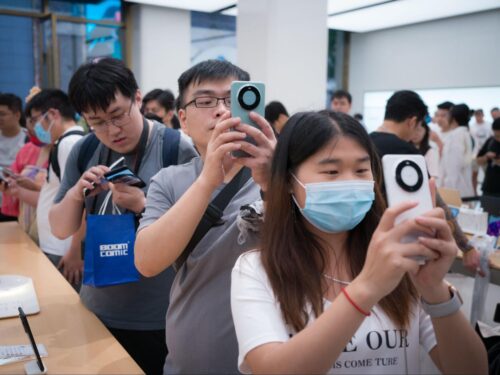A reprieve for Huawei, and farm goods purchases
Day 383 of the U.S.-China techno-trade war.

CNBC suggests that the trade war is coming down “to the U.S. easing up on Huawei and China buying agricultural products.”
“Olive branches were extended from both China and the U.S. as the two nations are set to restart face-to-face trade negotiations after a monthlong truce,” says CNBC:
President Donald Trump on Monday agreed to give “timely licensing decisions” to allow a slew of tech companies including Google and Broadcom to sell to Chinese telecom giant Huawei. The administration blacklisted Huawei in May at the height of the trade war, effectively halting its ability to buy U.S.-made chips.
On China’s side, President Xi Jinping seems to be following through on his promise made at the G-20 summit to continue buying U.S. agricultural products.
See also: Trump agrees to timely decisions on Huawei as China talks near, from Bloomberg via Yahoo. Here are other developments from various fronts of the U.S.-China techno-trade war, day 383 by our count, and news of Huawei around the globe:
Iranian oil: “For the first time, the Trump administration is imposing economic penalties on [Zhuhai Zhenrong, and its chief executive] for importing Iranian oil, a decision certain to add to tensions between Washington and Beijing,” reports the New York Times. China today called the sanctions “illegal,” according to AFP.
U.S. farmers still hope to sell pork to China as it copes with the African swine fever epizootic, according to Reuters. As the serious nature of the swine fever threat became known “during the second half of 2018, expectations for demand started to pick up — even though duties on U.S. pork going to China were raised to 62 percent from 12 percent last year as part of tit-for-tat trade sanctions.”
“Hikvision Digital Technology, China’s top surveillance camera provider, has sharply increased its stockpile of components and finished products amid concerns that the US may bar it from doing business with American suppliers like it did with Chinese telecommunications giant Huawei Technologies,” reports the South China Morning Post.
“Huawei has cut more than 600 jobs at its U.S. research unit Futurewei after Washington put the Chinese firm on a trade blacklist,” according to the BBC.
Huawei’s ambitions in Canada appear to be unaffected: “The embattled Chinese telecom giant Huawei has unveiled plans to deploy high-speed wireless internet to dozens of underserved communities in Canada’s remote northern regions,” reports the Guardian.
However, Huawei has a hostage problem. The company’s “Canadian unit sought to distance itself from the actions of the Chinese government on Monday, with a top local executive saying the company is worried about two Canadian men being held by Beijing,” says Reuters. A lot of Canadians are worried, too — the Christian Science Monitor reports on businesspeople canceling trips to China in fear of being detained or subject to an exit ban.
Meanwhile, in the U.K., “a decision on whether controversial Chinese firm Huawei should be excluded from the rollout of 5G mobile phone networks…has been postponed,” says the BBC.
In Italy, Huawei announced plans to invest $3.1 billion and directly create 1,000 new jobs from 2019 to 2021, reports the China Daily.






